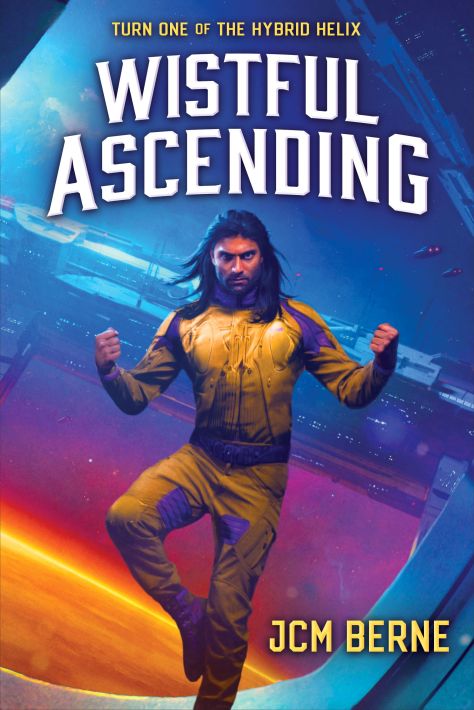
I’m a judge for the Self-Published Science Fiction Contest (SPSFC), and wanted to spotlight some of the authors in the contest. I loved JCM Berne’s Wistful Ascending (review here) and invited him on for an interview!
Author Interview: JCM Berne, Author of Wistful Ascending
My questions are in bold, with answers following.
What got you into writing speculative fiction?
First of all, speculative fiction is what I read. I find spec fiction empowering in a way the real world isn’t – a wizard or a starship captain (or a superhero) can impact the world in a way that a middle aged software developer finds quite difficult. I like those kind of stories, so that is what I read. When I read, I’m often very critical. I’ll find elements in a story I love, but other elements will take me out of the story, and then I search for a way to make my own thing that incorporates those parts that I loved while avoiding the pitfalls that annoyed me. That’s basically why I write: a love for parts of the genre crossed with a certain level of curmudgeonliness that makes me think I can do better.
That’s quite the origin story! I’m curious to know if there’s a specific book that led you to want to do better. I remember trying to write a couple sci-fi novels because I decided too much sci-fi had too many space battleships without any of them shooting at each other. I wasn’t well read, clearly, and haven’t gotten fiction published yet, either! Alas. What’s the elevator pitch for “Wistful Ascending?” What made you decide to combo space opera and superheroes?
No specific book got me interested in writing in general – maybe the Steven Brust Jhereg novels (he wrote fantasy crime fiction, and I wanted to do the same, but with a dwarf main character). That was back in the 90’s. The Hybrid Helix was sort of inspired by a very specific plot turn in the comic Invincible (now a cartoon on amazon) that I can’t really describe without spoiling that plotline. There are many other inspirations too; I keep finding elements of other stories I’ve read somewhere in the Hybrid Helix without having consciously putting them in. It’s a lot of theft from a lot of places!
The elevator pitch isn’t my strong suit; probably something like, “living weapon of mass destruction Rohan seeks a quiet life on a sentient space station trying to forget his past, but his past won’t forget him.” I really have a hard time marketing this book, finding comps for it, or describing its tone to people (you can tell by the number of reviews that start with ‘this book wasn’t what I expected’ – it’s incredibly common and, while nice, kind of annoying).
“Legends and Lattes but in space, with a side order of genocide.”
*Side-eyes my own review that talks about the unexpected combination of space opera and superheroes.* Yes, I’m sure it would get a bit old hearing the same thing every time! But it works so well! There are three books out in the series so far, and having read the first one, I’d say it works pretty well as a standalone with a ton of room to explore more stories. Does each book mostly wrap up its plot? How many books do you plan for the series?
Each book attempts to do the same thing – wrap up in a satisfying way while leaving room for more stories. I’ve gotten bad reviews, but nobody has complained about cliffhanger endings or unsatisfying resolutions. I do plan to write many more, and it’s possible I’d have some of them act as a trilogy, but that’s way farther down the road. And I’d be sure to explicitly tell people I’m doing that.
I jokingly tell people 25 books. I don’t know if that’s accurate, but that’s the ballpark I’m aiming for.
Awesome! I love that concept for a series because readers can know they aren’t going to get stuck with a cliffhanger without warning and wonder about a resolution until it comes. Obviously, the concept of space opera meets superhero brings all kinds of possibilities to mind. What challenges did using superpowers in space bring for you in writing? And, what’s your favorite superpower?
I seem to get that first question a lot, but superheroes and space have always gone together. Superman came to earth in a spaceship. Entire comic book series were taking place off earth since I was a kid – look at something like Jim Starlin’s Warlock series, for example (among many others).
The big challenge is trying to think of ramifications. If superpower X is possible, you kind of have to assume people have it, and that people have had it for a while. This assumption multiples with an interstellar setting – if there are many inhabited planets, there should be MANY people with whatever power or ability you come up with. How has that impacted history? If there is a balance of power, what maintains it? If there is constant warfare, why are there still people left alive?
That’s a big reason I don’t have real time travel or most kind of psychic powers. The biggest powers come with a cost, and defending against them has to be reasonably cheap. Otherwise the universe would be quite violent.
So the challenges for powers in space aren’t that different, just bigger in scale.
My favorite power is probably rapid healing. At my age the idea of waking up without pain is very appealing!
Thanks for the great interview! I think it gives readers a lot to look forward to–and extra reading. Where can readers find you?
I can be found at jcmberne.com, and on Amazon.
Thank you so much! I had fun with the questions!
Thank you!